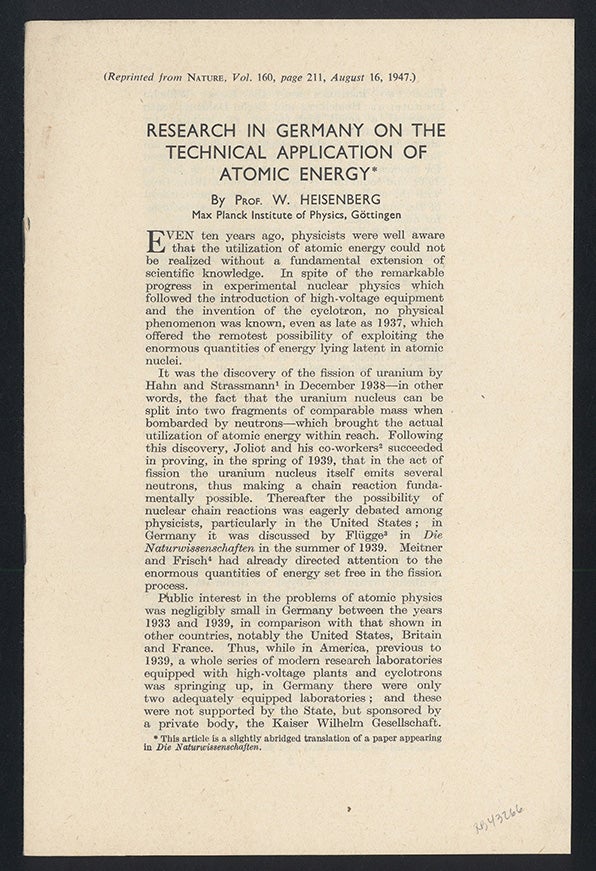
Research in Germany on the technical application of atomic energy. Offprint
Publisher Information: 1947.
Heisenberg, Werner (1901-76). Research in Germany on the technical application of atomic energy. Offprint from Nature 160 (1947). 10, [1]pp. 212 x 145 mm. Without wrappers as issued. Fine copy.
First Edition in English, Offprint Issue. During World War II Heisenberg was one of the principal scientists leading research and development in Germany’s nuclear energy program. At that time the Allies had no idea of how far Germany had progressed in the quest to build a nuclear reactor, but given Germany’s leading role in the advancement of nuclear physics they had every reason to believe that the Nazis were ahead of the game—in fact, the fear of a German “atom bomb” was one of the main reasons behind the establishment of the Manhattan Project. This fear turned out to be groundless: Due to a combination of factors, including Hitler’s dislike of “Jewish science” and the “White Jew” Heisenberg, Germany had fallen far behind the United States in the development of nuclear energy.
fter the bombing of Hiroshima Heisenberg became one of the primary crafters of Germany’s official account of its wartime nuclear energy program. In December 1946 he published his first postwar summary of the program in the journal Naturwissenschaften; the present English translation, slightly abridged from the German, appeared in Nature the following August. In the summary Heisenberg argued that Germany’s failure to advance its nuclear program was due both to enormous technical difficulties and to the lack of political and financial support; he also played up his own role in slowing down the project by quashing Nazi officials’ hopes for the imminent development of atomic weapons. “Heisenberg’s self-serving account parallels but overinterprets actual events. He especially did try to maintain scientific control over the [nuclear energy] project. He was also aware of the theoretical possibility of a nuclear explosive by late 1941, he did not demand a crash research and development to build one, and he did seem content to work for the rest of the war on the more modest program of building a reactor. It is difficult to assess his intentions and motives beyond that. But from what we know of his activities and research, there is nothing to support the notion that Heisenberg actually hindered the project in any way to keep an explosive out of Hitler’s hands or even that he himself had that much control of the situation” (Cassidy, Uncertainty: The Life and Science of Werner Heisenberg, p. 510).
Book Id: 43266Price: $2,750.00
